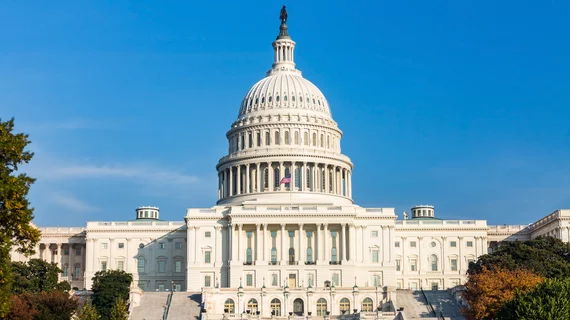Surprise billing ban agreement reached in Congress
Lawmakers have come to an agreement to stop surprise medical billing in new legislation that would also enact a number of other healthcare initiatives. The bipartisan agreement could put an end to the legislative stalemate on Capitol Hill in light of President Trump's impeachment proceedings.
The bill, The Lower Health Care Costs Act of 2019, was announced by the House Committee on Energy and Commerce and aims to lower out-of-pocket healthcare costs for Americans. The bill specifically singles out an end to surprise billing practices, where patients receive medical bills for services performed by out-of-network providers weeks or even months after they receive care. The practice has come under the spotlight after some news outlets highlighted sky-high medical bills for care.
In addition, the bill would fund Community Health Centers for five years, increase the purchasing age of tobacco to 21 and lower prescription drug and other medical costs to by requiring more transparency and competition.
“I do not think it is possible to write a bill that has broader agreement than this among Senate and House Democrats and Republicans on Americans’ number one financial concern: what they pay out of their own pockets for health care,” Senate Health Committee Chairman Lamar Alexander (R-Tenn.) said in a statement. “The legislation includes proposals from 80 senators, 46 Democrats and 34 Republicans. It would end surprise billing of patients by creating a new system of dispute resolution that includes arbitration, provide nearly $20 billion for five years of funding for the nation’s 1,400 community health centers, and lower the cost of prescription drugs and other medical services by requiring transparency and competition.”
The announcement of the legislation, which has yet to receive a vote in Congress, was met with general support for ending surprise billing and a warning from at least one industry group––the Association of American Medical Colleges (AAMC). In particular, AAMC took issue with the idea of rate setting in the legislation and the language of arbitration as a dispute resolution for ending surprise billing.
“While we are encouraged that the committees’ press statement mentions arbitration as part of its legislative framework, we remind Congress that even paired with arbitration, a benchmark rate could decrease patient access to care by incentivizing the exclusion of teaching hospitals from coverage networks and increasing narrow networks,” AAMC Chief Public Policy Officer Karen Fisher, JD, said in the group’s statement. “We continue to believe that arbitration, not rate setting, is the best solution to address billing disputes.”
Similarly, Rick Pollack, president and CEO of the American Hospital Association, hoped for changed in the arbitration language of the bill.
“Unfortunately, unless this proposal is much improved over previous bills that rely on a benchmark rate, it remains highly problematic and would jeopardize patient access to hospital care, particularly in rural communities,” Pollack stated. “An arbitrary rate gives insurers an incentive to remove hospitals from their networks and force artificially low reimbursement rates, which limits access. Moreover, such proposals would provide a huge windfall to commercial insurance companies at the expense of the nation’s community hospitals.
We urge Congress to take the time to get this policy right, and not rush a solution to surprise medical bills that would cause this level of disruption to the patients we serve.”

